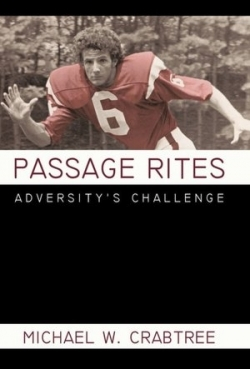Passage Rites
Adversity's Challenge
“Regrets are for those who have surrendered or given up striving, who have chosen to cower in the ‘face of adversity,’” writes Michael Crabtree, who faced life-changing legal problems when he was a young man, in Passage Rites: Adversity’s Challenge.
Crabtree earned a football scholarship to North Carolina State University, played in the 1976 Peach Bowl, and planned to become an engineer. After a severe back injury on the field cost him the scholarship, he dropped out of school. He left his home in Virginia Beach in 1978 to work on an oil rig in Texas, which he did for almost a year before returning to Virginia and college.
His legal nightmare began not long after his return, while he watched TV in his family’s home. Deputies came to the door and told Crabtree that he was wanted in Texas for armed robbery. The stunned young man was taken to jail, unable to answer questions about a crime he did not commit.
“I knew I was innocent, and my mind was being squeezed for every moment stored within to prove it,” he said of the days following his arrest. Details were not forthcoming from Texas about where or when the alleged crime had occurred, making it difficult for Crabtree to prove his innocence.
In Passage Rites, Crabtree relates the support of his family, neighbors, a sympathetic local sheriff, and teachers, who couldn’t believe he was capable of the crime. He also recounts the toll on his parents, who suffered along with their son and engaged an attorney for him in Houston.
Eventually, Crabtree is vindicated and he returns to Virginia, but he never finishes college or earns an engineering degree. He appears to lack self-esteem, even though he becomes a successful businessman. The emotional cost of his legal battle is life-long, but exactly how the incident has influenced his adult years is largely left untold—an unfortunate omission because such a perspective would be useful to readers.
Nonetheless, the story is told with raw, honest feelings as Crabtree brings readers through the almost unimaginable terror of being wrongly incarcerated.
The book would have benefited from a professional-quality cover and fewer moments of mundane dialogue: “Please call me Mike.” “I will. Call me Steve.” “Okay.”
This gut-wrenching memoir about three years in a young man’s life is a tale of triumph over adversity. It’s a reminder that even when judicial accusations are proven false, they continue to affect individuals and their families for a lifetime.
Reviewed by
Linda Salisbury
Disclosure: This article is not an endorsement, but a review. The publisher of this book provided free copies of the book and paid a small fee to have their book reviewed by a professional reviewer. Foreword Reviews and Clarion Reviews make no guarantee that the publisher will receive a positive review. Foreword Magazine, Inc. is disclosing this in accordance with the Federal Trade Commission’s 16 CFR, Part 255.

